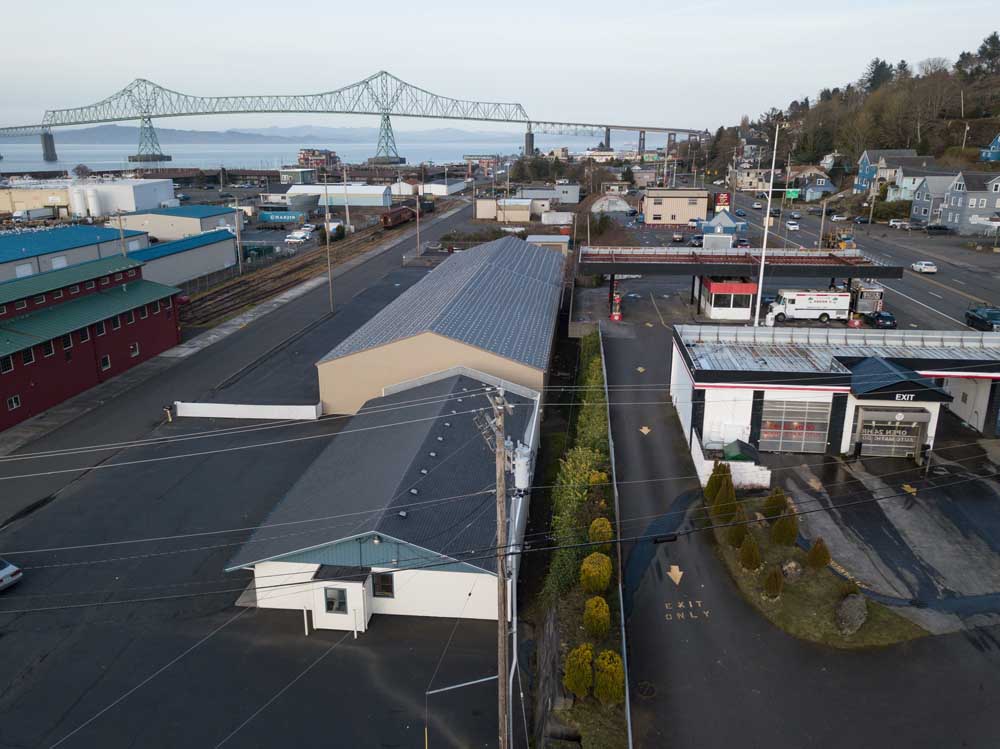Shipping containers pitched for housing in Uniontown
Published 12:30 pm Friday, March 6, 2020

- Developer Chester Trabucco plans to build a four-story container apartment complex along Industry Street, behind Dutch Bros Coffee and Fast Lube and Oil in Uniontown.
A swath of Uniontown above the Port of Astoria could become more than 100 units of workforce housing inside converted shipping containers.
Trending
Developer Chester Trabucco recently submitted plans to the city for a three- to four-story complex of between 75 and 108 two-room apartments, each made from two shipping containers placed side by side, he is calling Portway Station. The L-shaped development would run north from Marine Drive along Portway and Industry streets.
Trabucco described the apartments, each about 640 square feet and planned for rent at less than $1,000 a month, as ideal for people working in nearby seafood-processing plants or attending Clatsop Community College.
“It’s not where you want to spend the next 30 years of your life, necessarily, but it’s perfectly acceptable for a two-bedroom to live for a year to two … maybe looking to buy a home,” he said. “It’s condo living, essentially.”
Trending
The project would span multiple phases and several property owners.
John Harper, the investor behind Under the Bridge Cigarettes and other regional tobacco and marijuana stores, recently purchased a square of land at the corner of Portway and Industry streets from Richard Delphia that is proposed as part of the complex. The property houses a former marijuana store and butane hash oil-processing facility vacant since an explosion and fire in 2016.
Harper, who offers about 20 units of affordable housing throughout the region, argued that using containers will cut down on the development costs and ultimately make the apartments more affordable for renters.
“It can’t be driven from greed,” he said. “It has to be done because it’s needed, and that’s the affordable part of it. We’re doing it to make it affordable.”
Dirick Properties, belonging to Delphia, owns a portion of the project site along Industry Street, along with Burns-Johanson Oil Co., owned by Cary Bechtolt. Trabucco said the property might be part of a future phase.
Inspired by architect
Portway Station is inspired in part by a 17-home subdivision recently proposed but never built near Boise, Idaho. Architect David Hertel submitted plans to Garden City, Idaho, planners in 2016 for the development of 1,400-square-foot single-family homes, each made from four shipping containers. But the developer behind the concept went another direction, he said. Intrigued by the concept, Hertel still questions whether containerized housing is more affordable than prefabricated.
“It might make sense in a place like” Astoria, he said of containers. “It’s like anything in construction. The devil’s in the details. If you build affordable housing that’s cheaper … if it has modest finishes and whatnot, and it’s appointed with lower-end appliances and fixtures, it’s going to be affordable.”
John Scott, an employee of Harper’s long-interested in containerized housing, said he’s hoping to get more people interested in the concept. He is also planning a nine-container house on G Road in Miles Crossing, where Harper bought a dilapidated house and had local fire crews burn it down for training. The bottom floor, in the flood plain, would be parking and storage, while the top two floors would be the house.
“You can get the base structure for a very low cost,” he said. “It’s reusing something that’s stacking up.”
Multifamily housing is an outright use where Portway Station is proposed. But the concept faces several hurdles, such as how to provide enough parking, water and emergency access.
It could also be affected by the creation of new housing code amendments being considered by the Planning Commission, City Manager Brett Estes said. This is the first large-scale containerized housing proposal Estes has seen in Astoria.
“Staff broached the concept with the Planning Commission in December,” he said. “It’s a trend. We hear about it here and there.”
Water demands
The development team needs to study the water requirements of a sprinklered apartment complex just uphill from the Port, where seafood processors have already put a strain on city water supplies in peak season.
Developers would also need signoff for housing from the state Department of Environmental Quality. Portions of the property include a parking lot and former gas station, Val’s Texaco, along with the site of the former Delphia Oil Bulk Plant. Both areas are under a 2013 cleanup order from the state for fuel contamination, including a prohibition on residential development and soil monitoring for five years.
Despite the hurdles, Estes sees the promise of the project in the city’s need for workforce housing.
“I think that one of the things that was really identified in the Uniontown Reborn (master plan) area is looking for ways to have more workforce housing, to have people who live in that area that could work in the area, that could go and shop at the commercial core of Uniontown … to make that whole area become a more cohesive neighborhood,” he said.









